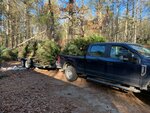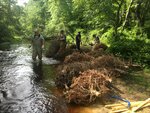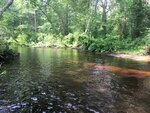


As you stand by the riverbank, the flowing water may seem tranquil, but to freshwater anglers, the dynamic rivers face challenges due to human influence and poor land use practices. These factors impact water quality and reduce habitat for native fish like wild brook trout, but thanks to a creative and sustainable Christmas tree collection event, habitats can begin to be restored.
In its sixth year, the Trees for Trout program, led by the Rhode Island Department of Environmental Management's Division of Fish and Wildlife (DFW) and the Rhode Island Chapter of Trout Unlimited (TU), aims to support healthy habitats for wild trout and aquatic organisms. On Saturday, January 6, the public is invited to drop off real Christmas trees at the Trees for Trout event from 9am-2pm at the Arcadia Check Station in the Wood River Arcadia Management Area. The trees will be strategically placed in streams to reduce erosion and stabilize riverbanks, providing refuge for fish.
For program participation, only real trees are accepted; fake trees or those treated with fire-resistant chemicals are not eligible. Removal of decorations, lights, and the stand is necessary, and only whole conifers are accepted – no tree trimmings. Stored until summer, DFW staff and TU volunteers use these trees to build "conifer revetments," mimicking natural habitat features. These structures trap sediment, decompose, and integrate into the riverbanks, creating protective habitats for brook trout and aquatic animals.
The Trees for Trout program offers a unique chance for the public to learn about river health, water quality, and aquatic habitats. In its inaugural year, 30 trees stabilized a stretch of the Upper Falls River, downstream from the Lawson Cary Access Point. With nearly 300 trees collected last year, interest continues to grow. Unlike other restoration projects, this program doesn't involve machinery; volunteers use wooden stakes and biodegradable twine to group trees, slowing water flow and creating fish habitats.
Remember, never dispose of Christmas trees in waterways or beaches without proper planning and permits under the Freshwater Wetlands Act. For information on disposing of real Christmas trees, visit the Rhode Island Resource Recovery Corporation's webpage. Stay informed about project updates by following DFW's Outdoor Education on Facebook, Instagram, or online.
Comments
No comments on this item Please log in to comment by clicking here